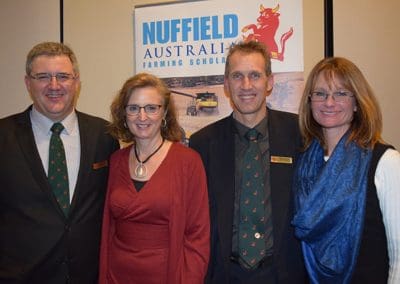
John and Bronny Gladigau, Robin and Rebecca Schaefer from northern Mallee collaborative family farm Bulla Burra are into their eighth harvest. Focus on profitability, while collaboration was the catalyst.
An innovative decision to collaborate to generate economies of scale otherwise not achievable on their own was a game-changing decision for South Australian farmers John Gladigau and Robin Schaefer.
Their Bulla Burra farming business in South Australia is now widely held up as a model for successful collaboration at farm level.
When agriculture minister Barnaby Joyce announced a $14.9 million investment in his Agriculture White Paper to encourage more farmers to enter collaborative or cooperative agreements, he pointed to Bulla Burra as a prime example of what can be achieved when farmers work together.
This week Grain Central asks Bulla Burra’s John Gladigau (pictured above) what he sees as the key issues around getting more farmers to benefit from collaborative work.
Motivation for change was tightening margins
“Our home farm was an average-size, conservatively run place, and as margins got tighter in the 1980s and ’90s we noticed that people going ahead were the ones who had access to capital and had the horsepower to create scale to cover the tight margins. We didn’t want to be the ones bought up by someone else’s future aggregation.
“We started to ask ourselves ‘what if we share labour?’, ‘what if we share machinery?’.
“We didn’t begin with the idea that we’d set up a collaborative farm. We started out sharing a labour unit, creating one full-time position between two farms 50 km apart, week on, week off.
“We had a strong focus on relationships and communication. It was open, professionally put together and it worked really well. So, then we thought what else can we share.
“We had been part of a farm discussion group and worked on ‘projects’ such as, ‘what if we put two farms together?’ The numbers stacked up really well.”
Cultural change among generations does not come naturally
“Collaboration probably doesn’t come naturally to people, but if you are outward-looking by nature you have a better chance of it suiting you. You are going to need to keep working on it. It’s about cultural change, and cultural change is always difficult because it’s bred into generations. It doesn’t happen quickly or easily. There will be governance rules in your structure, your collaboration will adhere to business principles, you will be accountable to somebody else and an independent person will have significant oversight of the business.
“I’m a pretty open sort of person,” he said, “but it always was and still is a challenge.”
On his Nuffield journey Mr Gladigau was looking for THE model, and found that it didn’t exist, each case was built on its own. “There is no model, there are no rules,” he said. He did find in other countries that good farmers everywhere are willing to share information. The top 10pc of farmers will share anything with you, and the bottom 10pc, nothing.
Mr Gladigau’s Nuffield key learning was that every successful business had an independent governance structure. The governance structure allows everyone to contribute but ensures decisions are not made on emotion. It requires a professional approach, a high level of accountability, transparency and always focuses on the business goals of efficiency and profitability. Otherwise you get caught up in your own world. I’d be the first to admit that. It is human nature. You have to be able to see past yourself and that is why it is so important to have an independent arbiter, chairman.
Collaboration works when, in your head, you have the view (of the other person) ‘what can I do for you?’.
It succeeds because you say, ‘you will grow and I will grow.”
Emotion is an impediment to sharing
“When people approach us, saying, ‘please help us collaborate,’ we talk many out of it because they are not ready for the cultural change.
Farmers see other farmers as being competitors, so at the idea of opening your books and being transparent with your competitor, they think other people are going to steal their secrets.
When people start the initial discussion about collaboration, and sharing, the barriers come up. The barriers are always based around emotions.
For the free daily email click on the following link: Get our free daily cropping news straight to your inbox – Click here
People perceive they’ll be giving up independence and they don’t like the thought of being accountable to somebody else. In reality they are not giving up independence, they are creating more independence, they are creating an environment in which they have a role. You create a flexibility of your time and your involvement. In Bulla Burra’s case, it’s a really big thing that our collaboration has allowed us to work in the areas of our passion, one of us based around the practical side and the other based around the business side. It’s absolutely transparent, we communicate all the time and both really enjoy what we do.”
Collaboration is a catalyst, and you can get your life back
“While the focus of the farm is profitability, benefits of collaboration come back into the business in an intangible way, which eventually flow back into profitability.
Collaboration was the catalyst, not the cure. It has made us a much more professional business. It ensured we had a robust decision-making process, and has given us flexibility in our time and our involvement.
When we started, we thought we’d make all the major decisions together. That lasted about 6 months and we naturally slipped into our areas of passion. What gets Robin (Schaefer) out of bed in the morning is farming, whereas I really enjoy the business stuff.”
Further reading:
- Rethinking the family farm
- Rural lawyer Bill Loughnan’s take on collaborative farming
- Collaborative Farming Australia website

HAVE YOUR SAY